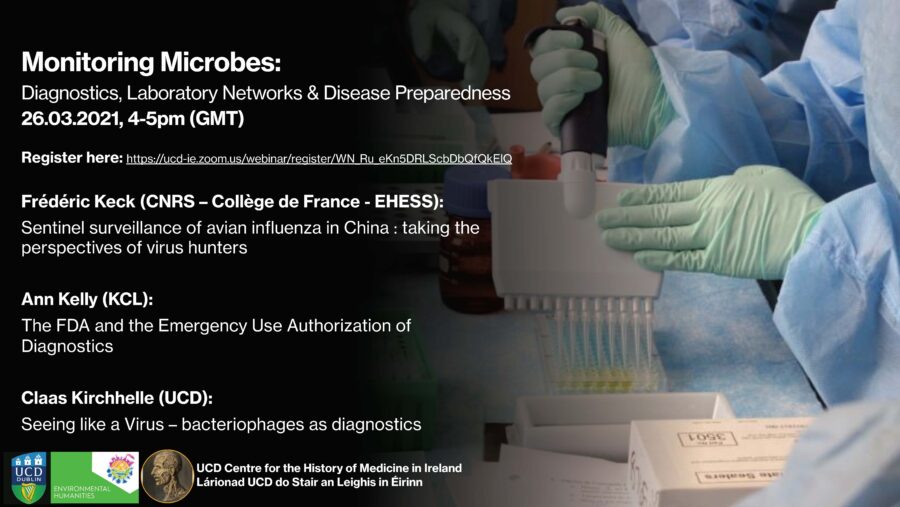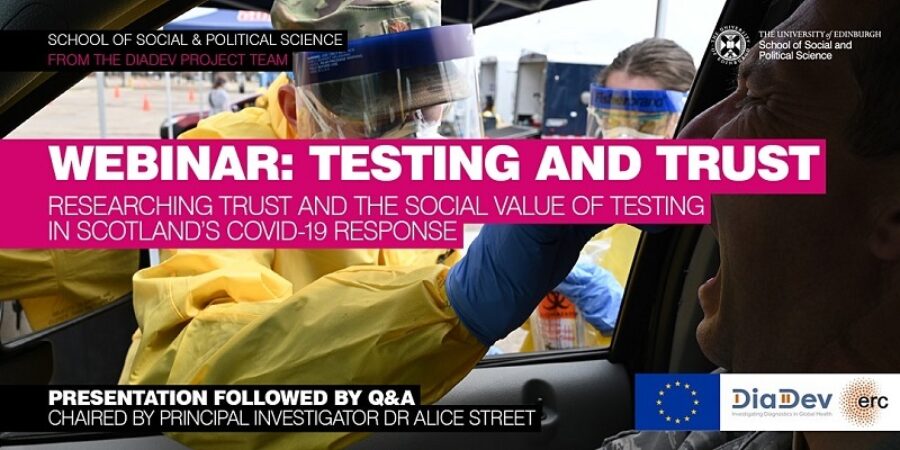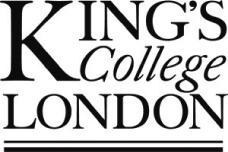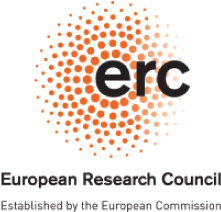Search Presentations content e.g. by keyword, title, location or presenter
Alice Street, Ritti Soncco, Aphaluck Bhatiasevi, 26.10.21
Epidemiology and laboratory medicine have a long, often contentious relationship. Yet, epidemiological knowledge also depends, fundamentally, on laboratory testing: to enable case detection, point-source identification, and disease tracking. Epidemiologists often employ rapid diagnostic tests in the field, and/or send samples to the laboratory for analysis and confirmation. National disease profiles are often collated from diagnostic data collected in clinical facilities, and depends on the capacity of clinical laboratories to carry out disease-specific tests. The availability and design of diagnostic tests therefore have an outsized influence on what epidemiologists are able to know. Diagnostic testing is often associated with medical visibility; it facilitates the medical gaze and makes population-level disease mapping possible. In this seminar, by contrast, we will explore what diagnostic tests conceal about the burden and dynamics of disease in the population. One facet of diagnostic obfuscation relates to the absence of diagnostic infrastructure and resources, either in particular places or for specific diseases, rendering whole diseases and populations data-invisible. Another facet relates to the design of diagnostic tests themselves, and how processes of technical optimisation can conceal as well as reveal aspects of disease. We will explore these issues through three case studies of diagnosis for 'neglected' diseases: Onchocerciasis, Melioidosis, and Lyme Disease. The development of rapid diagnostic tools for Onchocerciasis have been driven by elimination goals for the disease. Drawing on collaborative research undertaken with Emma M. Taylor, Alice Street will discuss how the optimisation of a novel test for specific elimination use-cases simultaneously occluded other kinds of epidemiological applications, and in doing so contributed to uncertainties about the public health value of the tool. Lyme disease diagnosis in the UK has become a site of contested epidemiologies, with patient groups citing what they see as poor diagnostic tests for the widespread under-diagnosis and under-reporting of the disease. In this presentation Ritti Soncco describes how patient advocates contest the dependence of formal epidemiological knowledge on a limited number of government authorised tests and put forward their own epidemiological claims, based on their informal ‘mapping’ of the disease through social networks and private laboratory testing rather than NHS based testing. At stake in the uncertain sensitivity of approved diagnostic tests are questions of how prevalent the disease is in the population, whether chronic Lyme exists, and also, since Lyme is caused by infection with bacteria that is transmitted to humans by ticks, how safe is the British landscape. Melioidosis is a bacterial disease transmitted to humans by contact with contaminated water or soil. Despite its often devastating impact on marginalised communities in Southeast Asia and Northern Australia, the disease receives little attention from the wider global health community. In this presentation, Aphaluck Bhatiasevi explores the role of diagnostic testing in the production of Melioidosis’s invisibility. The most common diagnostic methods for both clinical management and research entail bacterial culture of human specimens. But by focusing on disease in the human body, such methods potentially lead to the concealment of the wider presence of the pathogen in the environment, raising the question of how alternative testing methods could support an environmental epidemiology of melioidosis.
See details of the Hidden Epidemics network and seminar series here
Eva Vernooij, Francess Koker, Alice Street, 29.03.21
Central to the workings of a hospital are the technical and bureaucratic systems that ensure the effective coordination of information and biological materials of patients across time and space. In this paper, we adopt a patient pathway approach to examine moments of breakdown and repair in the coordination of patient care in a Sierra Leonean hospital. Through the in-depth analysis of a single patient pathway, we show how coordination work depends on frequent small acts of intervention and improvisation by multiple people across the pathway, including doctors, managers, nurses, patients and their relatives. We argue that such interventions depend on the individualisation of responsibility for ‘making the system work’ and are best conceptualised as acts of temporary repair and care for the health system itself. Examining how responsibility for the repair of the system is distributed and valued across the hospital, we argue, is essential to developing more sustainable systems for repair.
Dr Ann Kelly (Kings College London), 26.03.21
University College Dublin Zoom Webinar "Surveilling the Microbiome: Diagnostics, Laboratory Networks & Disease Preparedness".

Dr Alice Street, 28.01.21
Exploratory Webinar
As it has in other countries worldwide, Covid-19 testing has dominated the pandemic response in Scotland. The purposes to which testing has been put are manifold, from clinical diagnosis of severe cases in the early stages of the pandemic, to efforts at containment through the identification and isolation of symptomatic cases, to a much vaunted but somewhat vague elimination policy which has only now been accompanied by border testing, to the opening up of the economy through the provision of mass routine testing in schools, universities, workplaces and cultural venues. These efforts have also been characterised by a series of high-profile failures. One of the issues is that tests, in the form of testing numbers or the visibility of mass testing programmes, have become a proxy for government competence, with little interrogation of what tests actually do. Tests do not have any utility on their own – they only provide information. It is up to people to do things with that information. But with so much emphasis on the test as a standalone entity, the question of what happens after a test has been wilfully ignored by politicians and the media alike. Whether for PCR or LFT tests, the existence of testing programmes and numbers of tests have been used to claim political credit or pre-empt criticism, with little accountability in terms of what particular use cases have achieved in terms of containing or eliminating the virus.
Dr Alice Street, Dr Shona Lee, Eva Vernooij, and Dr Michelle Taylor, 27.11.20
Presented online
Alice Street, 8.10.20
Testing capacity has taken centre stage of the international response to the COVID-19 pandemic. As the epidemic curve has peaked and dipped, so have the meanings and value of testing been dramatically expanded beyond medical and public health uses to include such purposes as restarting economies or regaining intimacy with loved ones. Effective testing strategies have also been revealed to hinge on multiple relationships of trust: including trust in technology, in government, in oneself, and in strangers. In this presentation I will reflect on the social life of COVID-19 testing through research undertaken by a team of social scientists based at the University of Edinburgh and funded by the European Research Council and the Scottish Chief Scientists Office. This research shows that, while promises of certainty are often made for diagnostic tests, the social relationships on which testing depends often generate intense uncertainties in the testing process. Understanding those relationships and the values they embody, I argue, will be crucial if testing is to be effectively harnessed to meet the challenges of the COVID-19 pandemic.
Full details of the UNICA Network Webinar Covid-19 Biomedical, Social and Legal perspectives
Dr Alice Street and Dr Shona Lee, 30.09.20
Live Zoom Webinar

Testing and Trust is a rapid qualitative study investigating public understandings, expectations and experiences of Covid-19 testing in Lothian, Scotland and how testing strategies influence public trust in health services and government response. The study is being led by the DiaDev project team at the University of Edinburgh’s School of Social and Political Science, and is funded by the Chief Scientist Office’s Rapid Research in COVID -19 programme.
In this live webinar, we reported our findings from in-depth, socially contextualised research into people’s understandings of different Covid-19 tests, their expectations of how and when they should be tested, their experiences of testing and how test outcomes influence behaviour. The presentation was followed by a Q&A and discussion chaired by the study’s Principle Investigator Dr Alice Street.
Shona Lee, 28.08.20
Presented at the Association of Social Anthropologists (ASA) online annual conference 'How to live through a pandemic'
This paper examines how the international response to the 2014-2016 Ebola outbreak helped to prepare Sierra Leone’s health system for COVID-19. It draws on anthropological research on post-Ebola vaccine trials and laboratory strengthening programmes to explore health-worker experiences of epidemic response and preparedness efforts. These on-the-ground experiences and perspectives are under-recognised in evaluative exercises, but are critical to understanding which features of emergency response carry forward as sustainable infrastructures of preparedness. Analysis will centre on the hopes and expectations that technology-centred preparedness interventions foster for frontline workers in under-resourced health systems, the hidden efforts of building robust preparedness infrastructures, and the contribution of anthropological approaches to understanding preparedness as a social process. In describing the additional labour, informal networks, personal losses and social risks undertaken by laboratory and vaccine trial workers in order for protocols and practicality to meet, we reveal the social performance of preparedness. That is, the contextual engineering that make systems work through personal connections and sacrifice. The paper expands concepts of preparedness to include its personal and relational aspects, exploring the knowledge and value systems produced in epidemics. From this perspective, the Ebola response and aftermath helped prepare Sierra Leone for COVID-19 by developing capacity at individual and institutional levels, and blueprinting physical and social infrastructures for cultivating laboratory, vaccine development and clinical research systems. Yet failing to build the social experiences of response work into preparedness programmes risks erasing important knowledge of how these temporary assemblages are stabilised and sustained. COVID-19 has confirmed that the rhetoric of resilience is insufficient to capture the extent and expectation of sacrifice placed on staff. Responding to this pandemic requires investing in the long-term safety, security, and support of people undertaking the work prescribed by protocols, as well as that of making protocols work.
Page 1 of 3 Newer




